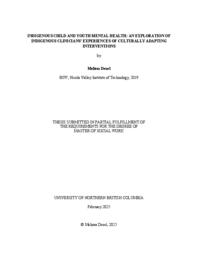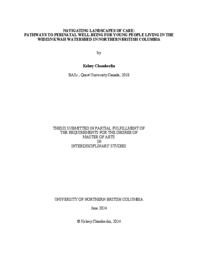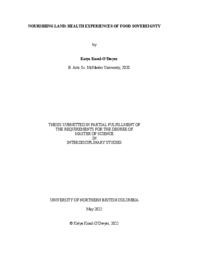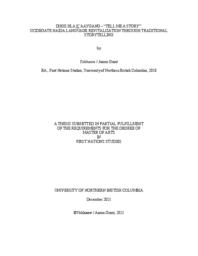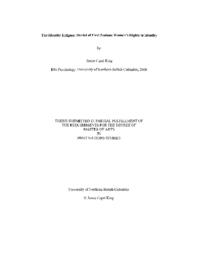King, Jessie
Person Preferred Name
Jessie King
Related Works
Content type
Digital Document
Origin Information
Content type
Digital Document
Origin Information
Content type
Digital Document
Description / Synopsis
Indigenous food sovereignty— a living reality prior to colonization, which violently disrupted Indigenous food systems—is characterized by Indigenous peoples’ self-determination in controlling their food systems and culturally informed foods practices. Directly related to ongoing coloniality, food insecurity is central to the disproportionately high burdens of poor health affecting Indigenous peoples. By exploring the health-related experiences of food sovereignty and Indigenous food sovereignty leaders living in northern BC, this project asks both: How does engaging in food sovereign practices affect peoples’ health? What are the factors that foster (or limit) food sovereignty practices? Being sensitive to past and ongoing colonial and paternalistic research approaches, this research enacts a community-informed ethos, anchored in community-based participatory research (CBPR) processes, wherein research is conducted with and for those involved. This research draws on qualitative methods, including semi-structured (virtual) interviews with community members and knowledge holders, including diverse food sovereignty and Indigenous food sovereignty champions. Champions are involved in various capacities, including direction of research design, engaging in interviews, and informing research outputs. Addressing gaps in the literature, this research documents holistic health experiences of food sovereignty and Indigenous food sovereignty leaders in northern BC. By highlighting experiences faced by those enacting food sovereignty practices, this research offers a counterview to existing bodies of food and health-related research and literature that rely predominantly on quantitative food security metrics. This project’s findings contribute to a growing body of scholarship documenting food sovereignty praxis: the work thus has the potential to inform policy that helps to support the resilience and self-determination of those doing food sovereignty and Indigenous food sovereignty.
Origin Information
Content type
Digital Document
Description / Synopsis
This Indigenous-led master’s thesis re-search focuses on my journey of Skidegate Haida language revitalization through Traditional storytelling. Framed by my Skidegate Haida conceptual framework, Ts’uu K’waayGa – “Cedar Sister”, I draw from Jo-Ann Archibald’s (2008) Storywork methodology with the methods of autoethnography and the Mentor Apprentice (MAP) guidelines to articulate my journey. From this, thirteen audio recorded stories (five in my Nanaay’s – Grandmother’s – voice and eight in my own voice) have come from my re-search. These stories are restricted to members of my Skidegate Haida community. Through this reflective re-search, four key themes emerged: “Language Learning is Hard” is an Understatement; Displacement, Discomfort, Relentless Questioning, and Self-Discovery; Your Mind and Spirit Need Time Alone to Reflect; and It is your Responsibility to Fight for your Ancestors
Origin Information
Content type
Digital Document
Description / Synopsis
Hadiksm Gaax di waayu, I belong to the Ganhada (Raven Clan) and my Mother’s side of the family is from Gitxaala, we follow our Mothers. This research, writing, and data collection was done on the traditional unceded territories of the Tsimshian, Lheidli T’enneh, and Musqueam. This work was done in partnership with the people who shared their stories with me, the co-researchers, whose words provide a brief glimpse into the lived experience of First Nations identity and the thought processes involved in contemplating several sources of input informing how we think about identity. Stories of identity, perceptions of identity, and experiences of racism and discrimination have inspired this work and highlighted the need for engagement. This research is a validation of thought processes that surround how we, First Nations people, experience identity. A shift away from Western conceptualizations of identity, this research discusses experiential knowledge, racism and discrimination, impacts of racial microaggressions on self-perceptions and health, and a sampling of how some people have come to define their identity in their own way based on their experiences. The intent of this work is to both inform those who may not understand and to acknowledge and validate those who have thought about First Nations identity but do not have a safe space to share. I hope this work speaks to both First Nations and non-First Nations/Settler Canadians as we continue learning about one another and sharing with each other in the spirit of reconciliation.
Origin Information
Content type
Digital Document
Origin Information

